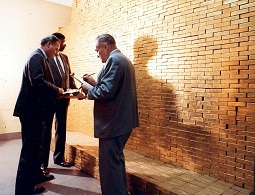 German Politicians Demand to See Gold in US Federal Reserve...
German Politicians Demand to See Gold in US Federal Reserve...

For decades, almost half of Germany's gold has been stored deep below the Federal Reserve Bank of New York. Now, with the euro crisis swirling, German politicians are asking their central bankers to take stock of the reserves. Some even say that the gold should be shipped home.
The Federal Reserve Bank of New York holds 1,536 metric tons of German gold, nearly half of Berlin's reserves. This enormous hoard of gold is stored in the fifth subfloor of the bank's building on Liberty Street, 25 meters (80 feet) below street level, and 15 meters below sea level. Bundesbank President Jens Weidmann wanted to personally convince Peter Gauweiler that the German gold was still where it should be. Early this summer, the head of Germany's central bank took the obstinate politician from the conservative Christian Social Union (CSU), a party that is a member of the government coalition in Berlin, and a number of his colleagues into the Bundesbank's inner sanctum: the gold vault. But even this personal inspection wasn't enough to reassure the visiting member of parliament -- on the contrary: "The Bundesbank monitors its domestic gold in an exemplary fashion," Gauweiler says, "and this makes it all the more incomprehensible that the bank doesn't look after its reserves abroad." For quite some time now, Gauweiler has been pestering the government and the Bundesbank with questions concerning where and how the country's reserves are stored, and how often they are checked. He has submitted requests and commissioned reports on the topic. Last week, Gauweiler celebrated his greatest triumph to date in his gold campaign, which has been a source of some amusement for many fellow German politicians: A secret report by the Federal Audit Office had been made public -- and it contained stern criticism of the German central bank in Frankfurt. The Bonn-based auditors urged a better inventory system, including quality checks. This demand, which even the bank's inspectors saw as nothing more than routine, alarmed the Berlin political establishment. Indeed, the partially blacked-out report read like the prologue to an espionage thriller in which the stunned central bankers could end up standing in front of empty vaults in the US.




